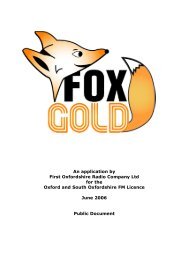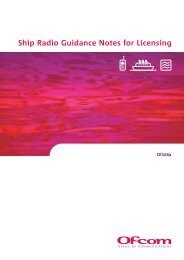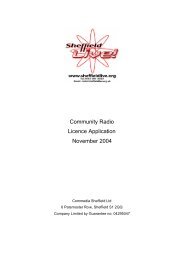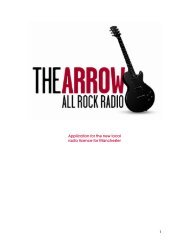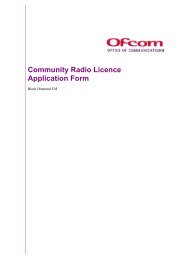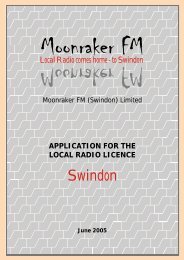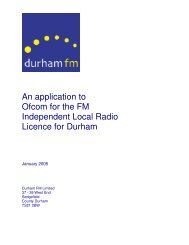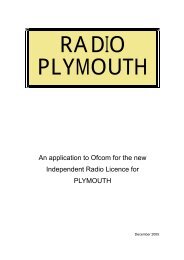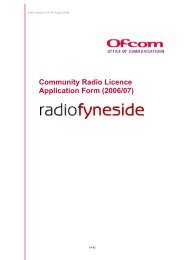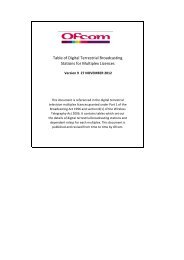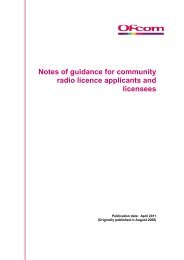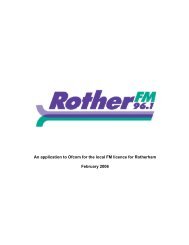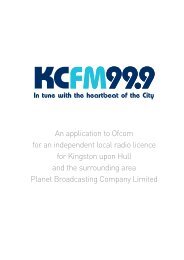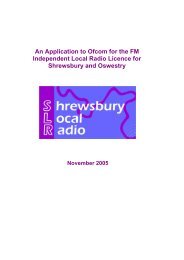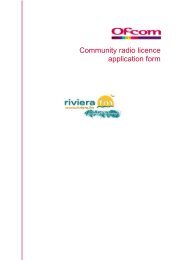Community radio licence application form TD1 ... - Ofcom Licensing
Community radio licence application form TD1 ... - Ofcom Licensing
Community radio licence application form TD1 ... - Ofcom Licensing
You also want an ePaper? Increase the reach of your titles
YUMPU automatically turns print PDFs into web optimized ePapers that Google loves.
organisations that do not presently have a voice.<br />
<strong>TD1</strong> Radio <strong>application</strong> <strong>form</strong><br />
The Sunday Getherin‟ programme was (until May 2011) carried by the local commercial <strong>radio</strong> station, however<br />
due to corporate networking the programme was axed. The presenter approached <strong>TD1</strong> Radio to enquire if we<br />
would be interested in broadcasting it, which we were delighted to do. The programme has proved to be a big<br />
success and attracts a large number of listeners not only in the local community but also worldwide via our<br />
Internet streaming. This demonstrates that there is an interest and a need for such a programme, which is<br />
backed up by hundreds of comments on the programme‟s Facebook page from listeners saddened at the thought<br />
of their favourite programme being axed. During 2012 we plan to also invite representatives from the local<br />
festivals (Common Ridings, Civic Weeks etc) into the studio to promote and talk about the events.<br />
Local music clubs and groups currently have no specialist programming on <strong>radio</strong> – something we also tackled<br />
last year. The Scottish Shindig was launched in June 2011 and features Scottish Dance Music. It also allows<br />
local fiddle and accordion clubs to advertise their community news, meetings and publicise open days. We have<br />
also broadcast recordings made at recent open days featuring local artists from the Scottish Dance Music Scene.<br />
(Something that is absent on existing local commercial <strong>radio</strong>) Similarly, we now boast a Folk music programme<br />
on a Sunday night, which is presented by two members from local folk music clubs. Again, this provides these<br />
clubs the chance to promote their events and news as well as being able to invite guests into the studio to talk<br />
and play live. During 2012 we also plan to expand the number of local folk clubs that are represented.<br />
On the spoken word front, we successfully launched Langlee Live, a weekly half-hour magazine programme<br />
which covers the issues, news and events from the community of Langlee in Galashiels. We have (and will<br />
continue to) invite guests from the community into the studio to talk about what is happening in their community<br />
as well as discuss burning issues of the moment.<br />
C: How will your proposed community <strong>radio</strong> service add to the range of programmes available on non-<br />
BBC local services (commercial and community stations) to members of the relevant community or<br />
communities, add to the overall range of such services in the area concerned and be different and<br />
distinct from them? Please tell us which non-BBC local services your station will overlap with.<br />
Answer in fewer than 400 words:<br />
We will overlap with Radio Borders, but as mentioned previously, we are already providing different programming<br />
from them. We can happily devote a 30 minute programme to feature local news from a specific community (e.g.<br />
Langlee or Bannerfield), Radio Borders would be unable to do so as it would be deemed unfair to listeners in the<br />
rest of the region. By our very nature, we can focus on these communities and ensure they are given airtime.<br />
During 2012 we plan to move to new studios in Langlee in Galashiels. By basing ourselves in the heart of this<br />
community we can ensure that we are there to provide programming relevant to the community we will serve on<br />
FM.<br />
Our <strong>radio</strong> station can also allow students or young people to make their own programmes and provide training for<br />
them, something that commercial <strong>radio</strong> would have little or no time to do.<br />
Coverage of local charity events or open days is another different service we can provide. Commercial <strong>radio</strong>, by<br />
its very nature, would mean a fee would be charged in most cases, something that a local community group<br />
could not afford. As community <strong>radio</strong> station we can provide the coverage and outside broadcast facilities free of<br />
charge or at a greatly reduced cost. During 2011 we were “on the road” for eight months of the year bringing live<br />
coverage from events right into the homes of our listeners. We already have a diary filling up quickly for coverage<br />
from events for this year. This alone tells us that the event organisers want us to come back and broadcast live<br />
from their events. Listener interaction too is overwhelming, with hundreds of messages and comments being left<br />
for us during and after our outside broadcasts, either by email or on our Facebook page…<br />
To further enhance our output, our media and market research has helped us develop our proposed new<br />
programme schedule where we can now offer new local <strong>radio</strong> features. These include an NHS Borders Health<br />
spot, <strong>Community</strong> Council news, local minority sports news, local charity news, unsigned local bands, local<br />
history, local groups and clubs, youth groups, uni<strong>form</strong> groups and others. Team meetings and discussions<br />
throughout 2012 will bring these to fruition.<br />
All of the aforementioned points ensure that our output is and will be very different to Radio Borders.<br />
4



